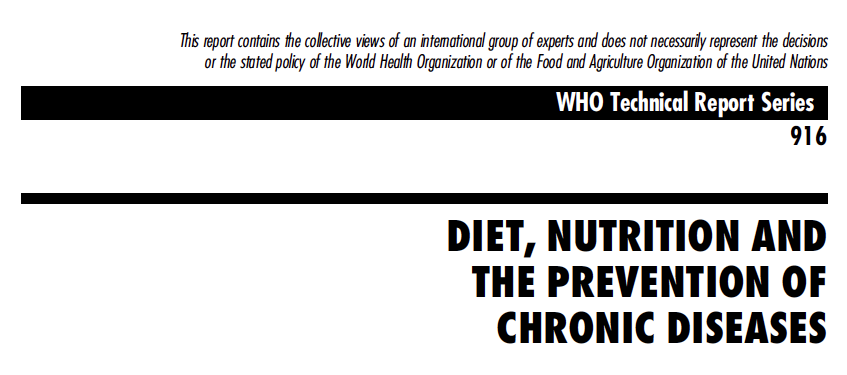sehr interessant! jetzt kenne ich diese publikation seit zehn jahren. sie ist immer noch ein standardwerk der ernährungsprävention. ich habe sie von vorne nach hinten, und von hinten nach vorne gelesen. konnte ihre tabellen zeitweilig fast auswendig rezitieren. und jetzt erst finde ich auf den seiten 140/141 im kapitel strategic directions and recommendations for policy and research – prerequisites for effective strategies den punkt sustainable development und folgende passage, die ich so bemerkenswert finde, dass ich sie hier wiedergeben möchte. wohlgemerkt, herausgegeben hat den bericht die weltgesundheitsorganisation, und es geht darin um den zusammenhang zwischen ernährung und chronischen krankheiten!
“The rapid increase in the consumption of animal-based foods, many of which are produced by intensive methods is likely to have a number of profound consequences. On the health side, increased consumption of animal products has led to higher intakes of saturated fats, which in conjunction with tobacco use, threatens to undermine the health gains made by reducing infectious diseases, in particular in the countries undergoing rapid economic and nutrition transition. Intensive cattle production also threatens the world’s ability to feed its poorest people, who typically have very limited access to even basic foods. Environmental concerns abound too; intensive methods of animal rearing exert greater environmental pressures than traditional animal husbandry, largely because of the low efficiency in feed conversion and high water needs of cattle.
Intensive methods of livestock production may well provide much needed income opportunities, but this is often at the expense of the farmers’ capacity to produce their own food. In contrast, the production of more diverse foods, in particular fruits, vegetables and legumes, may have a dual benefit in not only improving access to healthy foods but also in providing an alternative source of income for the farmer. This is further promoted if farmers can market their products directly to consumers, and thereby receive a greater proportion of final price. This model of food production can yield potent health benefits to both producers and consumers, and simultaneously reduce environmental pressures on water and land resources.
Agricultural policies in several countries often respond primarily to short-term commercial farming concerns rather than be guided by health and environmental considerations. For example, farm subsidies for beef and dairy production had good justification in the past – they provided improved access to high quality proteins but today contribute to human consumption patterns that may aggravate the burden of nutrition related chronic disease. This apparent disregard for the health consequences and environmental sustainability of present agricultural production, limits the potential for change in agricultural policies and food production, and at some point may lead to a conflict between meeting population nutrient intake goals and sustaining the demand for beef associated with the existing patterns of consumption. For example, if we project the consumption of beef in industrialized countries to the population of developing countries, the supply of grains for human consumption may be limited, specially for low-income groups.
Changes in agricultural policies which give producers an opportunity to adapt to new demands, increase awareness and empower communites to better address health and environmental consequences of present consumption patterns will be needed in the future. Integrated strategies aimed at increasing the responsiveness of governments to health and environmental concerns of the community will also be required. The question of how the world’s food supply can be managed so as to sustain the demands made by population-size adjustments in diet is a topic for continued dialogue by multiple stake-holders that has major consequences for agricultural and environmental policies, as well as for world food trade.”
aus: WHO (Hrsg.). Joint WHO/FAO expert consultation: Diet, Nutrition and the Prevention of Chronic Diseases (Technical Report Series 916). Geneva, 2003 (Download)
